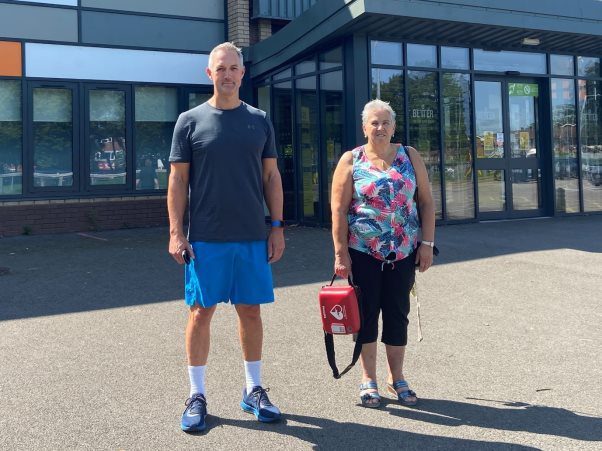“Defibrillators can only save lives if people know where they are”. That’s the message from a Cardiff father of two, who suffered a cardiac arrest while playing football with his son at Eastern Leisure Centre, despite considering himself fit and healthy at the time.
The British Heart Foundation’s new campaign urges people in Wales to register defibrillators on a new national database, called The Circuit – the National Defibrillator Network, which could help save thousands of lives from cardiac arrests in the coming years.
Andrew Barnett’s story has been chosen as part of the campaign to highlight the issue. In the film, which has been broadcast on BBC Wales, 48-year-old Andrew Barnett describes the scene in December 2018 at Eastern Leisure Centre in Cardiff when his life was saved by strangers.
Andrew says: “I’d taken my son to an adults-and-kids’ Christmas football match. I was running around as normal, kicking the ball. From what everyone tells me afterwards, I pretty much just fell straight on my face. It just happened instantly. I had a cardiac arrest.
“Two of the leisure centre members ran out, and they also brought the defibrillator out as well, which was situated at the leisure centre. I think luck was a really big part of it, the location I was, that had trained staff, had the defibrillator available as well.”
Leisure centre duty manager Ben Clarke was in the office when he was told about Andrew’s collapse.
He says, “I grabbed the defibrillator from reception and ran out – as soon as I got there, I could see he was not in a good way, he was unconscious. I started CPR – a colleague started unpacking the defib. I continued CPR and the machine showed he needed a shock.”
Sheila Mott was a swimming instructor at the centre and used the defibrillator on Andrew.
She followed the instructions given by the machine, which restarted Andrew’s heart. When the paramedics arrived, they did all their checks and took over before Andrew was taken to hospital by ambulance.
Andrew was treated for a blocked coronary artery with a stent and medication and has returned to an active life once more.
Andrew, Ben and Sheila are calling on anyone with access to a defibrillator to register as a defibrillator guardian on The Circuit, and Andrew says, “I think The Circuit is another emergency service, if you like. It’s something that is going to be in our communities – town, cities and villages that will tell people exactly where they can get hold of a defibrillator. Having the network and knowledge of where they are for the ambulance service, I think it’s so important. I’d say to anyone who has a defibrillator in their club, community or workplace: Register your defibrillator to help save more lives.”
Sheila adds, “Everyone should learn CPR, and everyone who has access to a defibrillator should register it on The Circuit. Unless it’s registered, how will people know where it is if it’s needed?”
Adam Fletcher, Head of British Heart Foundation Cymru says, “Every second counts when someone has a cardiac arrest and, alongside CPR, prompt use of a defibrillator is critical in giving them the best chance of survival. To put it simply – knowing where the nearest defibrillator is, could be the difference between life and death.
“The Circuit is pioneering technology which will help emergency services direct bystanders more quickly to a defibrillator when someone collapses with a cardiac arrest. But, for The Circuit to save lives, it is vital that the tens of thousands of unregistered defibrillators across the UK are put on the system.
“If you, or somebody you know is a defibrillator guardian, then we urge you to register your device on The Circuit. You could help save a life.”









Leave a Reply
View Comments